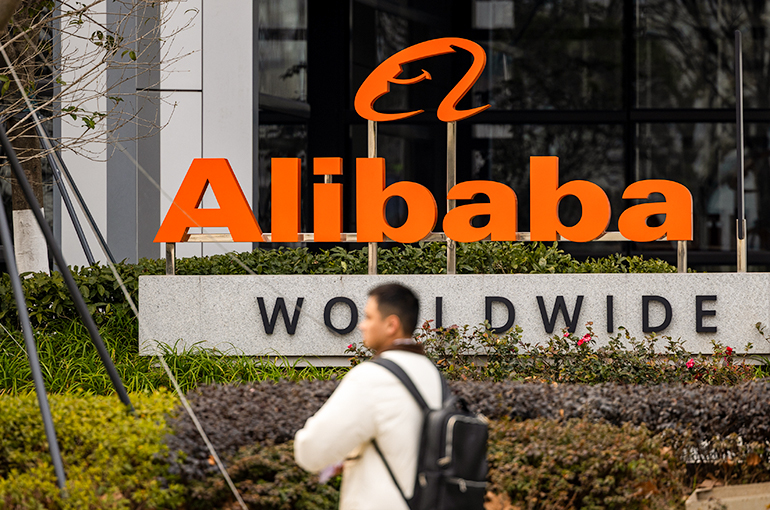 Alibaba's Profit Halves in September Quarter Amid Heavy AI Investment, Delivery War
Alibaba's Profit Halves in September Quarter Amid Heavy AI Investment, Delivery War(Yicai) Nov. 26 -- Chinese e-commerce giant Alibaba Group Holding has seen its net profit shrink by half in the fiscal second quarter, dragged down by significant investment in artificial intelligence and the raging war in the food delivery sector.
Net profit narrowed 53 percent to CNY20.6 billion (USD2.9 billion) in the three months ended Sept. 30 from a year earlier, the Hangzhou-based company said in its second-quarter earnings report released yesterday.
Revenue rose 5 percent to CNY247.8 billion (USD34.8 billion) in the period, beating market expectations for CNY245.2 billion. Excluding revenue from the disposed businesses of Sun Art and Intime, revenue on a like-for-like basis would have expanded 15 percent.
Income from operations plunged 85 percent to CNY5.4 billion (USD754 million), primarily due to the investment in quick commerce, user experiences, and technology, partly offset by a double-digit growth in e-commerce revenue, improved operating results supported by continued growth in cloud business, and enhanced operating efficiencies across various businesses.
AI Push
"We have entered into an investment phase to build long-term strategic value in AI technologies and infrastructure and a consumption platform integrating daily life services and e-commerce," said Eddie Wu, chief executive officer of Alibaba. “With our significant strategic investments in these areas, our two core businesses of AI + Cloud and consumption continued to deliver strong growth this quarter.”
Robust AI demand further accelerated the development of Cloud Intelligence Group. Revenue from this segment expanded 34 percent to CNY39.8 billion, primarily driven by public cloud revenue growth, including the increasing adoption of AI-related products.
"Over the past four quarters, we have deployed approximately CNY120 billion in capital expenditure toward AI and cloud infrastructure," said Toby Xu, chief financial officer of Alibaba.
In February, Wu announced Alibaba would invest CNY380 billion in cloud and AI infrastructure over the next three years, which is more than the company's total technology investment in the past decade.
Alibaba plans to further increase its investment in AI, the management noted in the earnings conference call.
The global AI industry chain, from semiconductor manufacturing to memory and central processing units, has generally been in shortage since the second half of this year, Wu said, adding that this expansion cycle driven by AI demand will last at least two to three years, during which AI resources will continue to be in short supply.
"We don't think there will be a so-called 'AI bubble' in the next three years," Wu noted, claiming that the previously announced CNY380 billion investment plan seems a bit conservative now.
Delivery War
Early this year, Alibaba's competitor JD.Com made a foray into the food delivery industry, setting off a price war. In response, Alibaba launched in April instant retail business Taobao Flash Buy, based on its existing food delivery platform Ele.me, and announced in July that it would invest CNY50 billion (USD7.1 billion) in the next 12 months to cash out subsidies to users.
Revenue from the Quick Commerce Business surged 60 percent to CNY22.9 billion in the September quarter from a year earlier, mainly thanks to a growth in orders after the launch of Taobao Flash Buy.
Meanwhile, Alibaba is working to narrow Taobao Flash Buy's losses. In October, the loss per order of Taobao Flash Buy has halved from July and August, thanks to the optimization of the order structure and the reduction in logistics costs brought by the scale effect, Jiang Fan, CEO of Alibaba China E-Commerce Group, said in the earnings conference call.
The management unveiled that Alibaba will pay more attention to efficiency and appropriately reduce investment in delivery services in the future.
The third quarter is a peak investment period for Taobao Flash Buy, as the overall operational efficiency of the business improves and the scale stabilizes, Xu said, adding that the investment in this business will shrink significantly in the next quarter.
Alibaba's shares [HKG: 9988] were trading down 1.6 percent at HKD155.30 (USD19.96) as of 11 a.m. in Hong Kong today, after opening 2.4 percent down. In New York, the company's stock [NYSE: BABA] fell 2.3 percent to USD157.01 yesterday.
Editors: Dou Shicong, Futura Costaglione